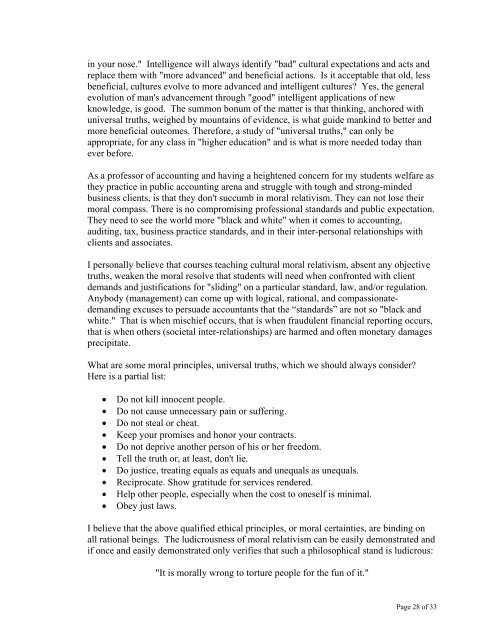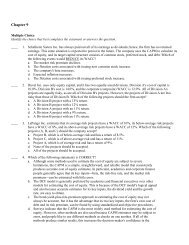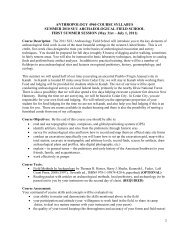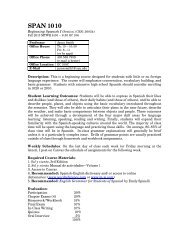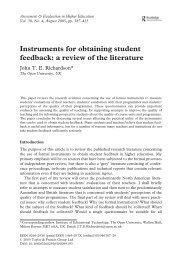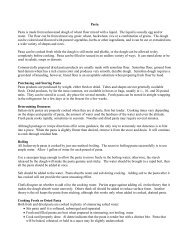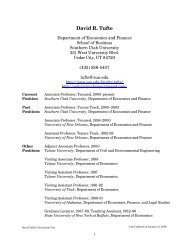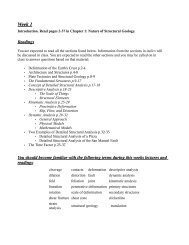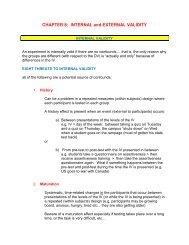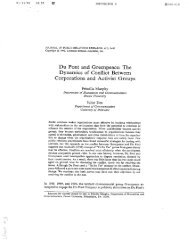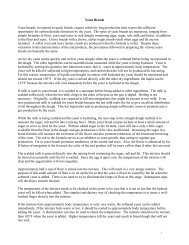Jeffrey Barnes: Self-Evident Truths - Southern Utah University
Jeffrey Barnes: Self-Evident Truths - Southern Utah University
Jeffrey Barnes: Self-Evident Truths - Southern Utah University
You also want an ePaper? Increase the reach of your titles
YUMPU automatically turns print PDFs into web optimized ePapers that Google loves.
in your nose." Intelligence will always identify "bad" cultural expectations and acts and<br />
replace them with "more advanced" and beneficial actions. Is it acceptable that old, less<br />
beneficial, cultures evolve to more advanced and intelligent cultures? Yes, the general<br />
evolution of man's advancement through "good" intelligent applications of new<br />
knowledge, is good. The summon bonum of the matter is that thinking, anchored with<br />
universal truths, weighed by mountains of evidence, is what guide mankind to better and<br />
more beneficial outcomes. Therefore, a study of "universal truths," can only be<br />
appropriate, for any class in "higher education" and is what is more needed today than<br />
ever before.<br />
As a professor of accounting and having a heightened concern for my students welfare as<br />
they practice in public accounting arena and struggle with tough and strong-minded<br />
business clients, is that they don't succumb in moral relativism. They can not lose their<br />
moral compass. There is no compromising professional standards and public expectation.<br />
They need to see the world more "black and white" when it comes to accounting,<br />
auditing, tax, business practice standards, and in their inter-personal relationships with<br />
clients and associates.<br />
I personally believe that courses teaching cultural moral relativism, absent any objective<br />
truths, weaken the moral resolve that students will need when confronted with client<br />
demands and justifications for "sliding" on a particular standard, law, and/or regulation.<br />
Anybody (management) can come up with logical, rational, and compassionatedemanding<br />
excuses to persuade accountants that the “standards” are not so "black and<br />
white." That is when mischief occurs, that is when fraudulent financial reporting occurs,<br />
that is when others (societal inter-relationships) are harmed and often monetary damages<br />
precipitate.<br />
What are some moral principles, universal truths, which we should always consider?<br />
Here is a partial list:<br />
• Do not kill innocent people.<br />
• Do not cause unnecessary pain or suffering.<br />
• Do not steal or cheat.<br />
• Keep your promises and honor your contracts.<br />
• Do not deprive another person of his or her freedom.<br />
• Tell the truth or, at least, don't lie.<br />
• Do justice, treating equals as equals and unequals as unequals.<br />
• Reciprocate. Show gratitude for services rendered.<br />
• Help other people, especially when the cost to oneself is minimal.<br />
• Obey just laws.<br />
I believe that the above qualified ethical principles, or moral certainties, are binding on<br />
all rational beings. The ludicrousness of moral relativism can be easily demonstrated and<br />
if once and easily demonstrated only verifies that such a philosophical stand is ludicrous:<br />
"It is morally wrong to torture people for the fun of it."<br />
Page 28 of 33


